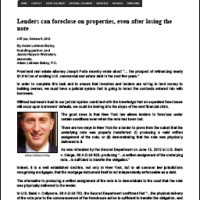4:57 pm, October 8, 2012
By Adam Leitman Bailey, founding partner, and Jackie Halpern Weinstein, associate, Adam Leitman Bailey, P.C.
Prominent real estate attorney Joseph Forte recently wrote about “… the prospect of refinancing nearly $1.8 trillion of existing U.S. commercial real estate debt in the next five years.”
In order to complete this task and to ensure that investors and lenders are willing to lend money to building owners, we must have a judicial system that is going to honor the contracts entered into with borrowers.
Without business’s trust in our judicial system combined with the knowledge that an expedient foreclosure will occur upon borrowers’ defaults, we could be looking into the abyss of the next financial crisis.
The good news is that New York law allows lenders to foreclose under certain conditions even when the note has been lost.
There are two ways in New York for a lender to prove from the outset that the underlying note was properly transferred: (i) producing a valid written assignment of the note, or (ii) demonstrating that the note was physically delivered to it.
As was reiterated by the Second Department on June 13, 2012 in U.S. Bank v. Cange, 96 A.D.3d 825, producing “…a written assignment of the underlying note…is sufficient to transfer the obligation.”
Indeed, it is a well established doctrine, not only in New York, but in all common law jurisdictions recognizing mortgages, that the mortgage instrument itself is not independently enforceable as a debt.
The alternative to producing a written assignment of the note is to demonstrate to the court that the note was physically delivered to the lender.
In U.S. Bank v. Collymore, 68 A.D.3d 752, the Second Department confirmed that “…the physical delivery of the note prior to the commencement of the foreclosure action is sufficient to transfer the obligation, and the mortgage passes with the debt as an inseparable incident.”
New York courts have repeatedly held that a note and mortgage may be transferred by delivery without a written instrument of assignment.
After the lender demonstrates that it owns the note, it must then explain to the court the circumstances upon which the note was lost. In New York, the loss of negotiable instruments, such as promissory notes, are addressed in, and protected by, the Uniform Commercial Code. UCC §3-804 (Lost, Destroyed, or Stolen Instruments).
As per the NY General Business Law, the facts preventing production of the note can be demonstrated “by parol or other secondary evidence.”15 Most often, lenders submit affidavits describing exactly what happened to the note, in addition to setting forth a step-by-step explanation of all reasonable efforts taken to find the missing note.
But, as was established in Citibank v. Lin, “…merely stat[ing] that ‘[p]laintiff and its servicing agent [are] now unable to locate the…note'” is insufficient.
It is also prudent to confirm in any affidavit that the note has not been sold or transferred to any third party. Although outside the scope of this article, it should be mentioned that the court is authorized in these situations to require security indemnifying the borrower against the possibility of double liability, should the note later turn up in the hands of a holder in due course, who is not the lender.
While such a holder of only the note would be unable to foreclose, it would be able to bring an ordinary lawsuit on the note itself, and would even have available the expedited procedures of CPLR 3213, to wit, a motion for summary judgment in lieu of complaint.
Finally, in order to foreclose despite a lost note, the lender must also prove the terms of the missing instrument.
The terms of the note can be set forth in the same affidavit setting forth the facts preventing the production of the note, and should include details such as, without limitation, the name of the last holder in possession, the name of the borrower, the name of the person that signed on behalf of the borrower (whether the actual borrower or an agent), the type of note, the effective date, the full value of the note, the payment terms, the loan number, and the amount currently unpaid under the note.
Courts have rejected affidavits, however, which are not based on personal knowledge. For example, in Lin, the court denied the lender standing because the “…affidavit relie[d] only ‘upon personal knowledge, based on books and records of [the bank].'”
The Second Department has suggested, though, as in Brown Bark v. Weiss & Mahoney, 90 A.D.3d 963, that attaching a copy of a form note to the affidavit, assuming a form was used to create the lost note, could help prove the terms of the lost instrument.
Penalizing the purchasers of notes and mortgages on the secondary market, by interfering with their rights to foreclose on defaulted loans, under which loans the original lenders unequivocally lent hundreds of thousands of dollars per transaction, will do nothing but keep our court system clogged and our economy befogged.
For our economy to fully rebound from the housing crisis, we need to put the homes into the hands of people that can afford them.
Once the foreclosures are pushed through the pipes, there will be more open houses on the market, the prices will drop, and housing will resultantly be made more affordable. We cannot keep looking into the past and throwing blame, since there were really no innocent parties to our housing crisis.
Rather, we must focus on getting the economy back into shape, and we humbly submit that this article provides an ample framework for expediting the foreclosures that are trapped in our court system simply due to a lost note.
https://alblawfirm.com/articles/lenders-foreclose-properties/


 Twitter
Twitter